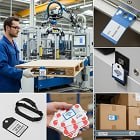RFID in Inventory and Asset Automation
RFID technology for automation of accounting
TOP areas of automation of accounting based on RFID technologies:
- Access automation
- Accounting of returnable containers
- Control, accounting and management of vehicle movement
- Accounting of material assets
- Clothing - a wide range of RFID applications: from brand protection to sales and laundry control.
RFID: access automation
Almost everyone is familiar with this technology - these are passes at enterprises, access cards for offices, hotels and SPA complexes. This category also includes radio key fobs for controlling gates and barriers. Usually, short-range RFID systems are used for people, and for transport - active tags or key fobs with autonomous power supply.
RFID: accounting of returnable containers
This is one of the most widespread and effective areas of application of radio frequency identification. Anything that relates to returnable containers - pallets, boxes, cylinders, kegs, bags, big bags - can be marked with RFID tags. This allows you to take accounting and control to a qualitatively new level.
RFID for transport
This technology has become widespread:
- background payment on toll roads,
- accounting for vehicle and trailer inspection coupons,
- RFID tags on the windshield for automated access and traffic control,
- automation of weighing of automobile and rail transport.
RFID: accounting of material assets
RFID technologies are becoming a key tool in the automation of accounting of material assets of enterprises. Although they are not yet able to completely replace barcodes and QR codes, in a number of scenarios their use is much more effective. Main advantages and areas of use:
- Acceleration of inventory RFID tags can be read without direct visibility and at a distance, which allows inventory to be carried out several times faster — both selective and complete.
- Automation of movement control RFID tags record the facts of asset movement between departments, offices, warehouses or facilities, and also control the removal/entry of equipment at checkpoints.
- Increasing the accuracy of accounting
- Reducing the influence of the human factor and automatic registration of events eliminate losses, unaccounted movements and errors in the database.
- Integration with ERP and EAM systems RFID solutions are easily integrated into existing asset accounting and management systems (for example, 1C, SAP, EAM.WebRozum), ensuring data relevance and process transparency.
- Control of condition and maintenance.
- Accounting for office equipment and IT equipment RFID helps to keep track of laptops, servers, scanners, terminals data collection and other equipment - both in offices and at remote sites.
RFID in clothing: from brand to wash
RFID technologies are increasingly used in the clothing and textile industry, covering the entire life cycle of a product - from production to operation and recycling. Below are the key areas of RFID use in this area:
- Brand and authenticity protection Embedded RFID tags allow you to confirm the originality of products, protecting brands from counterfeiting and simplifying the authentication process for customers and partners.
- Retail automation RFID simplifies inventory, speeds up product acceptance and allows you to track shelf balances in real time, which is especially important for fast fashion and sportswear chains. Next-generation fitting rooms RFID tags can be used to implement interactive "smart fitting rooms" where product information, recommendations, and availability of other sizes/colors are displayed on the screen.
- Control of rented and uniform clothing RFID is used to track uniforms in hotels, manufacturing, medicine, and other industries. This allows for automated accounting, reduced losses, and wear control.
- Monitoring of laundry and dry cleaning RFID tags are resistant to moisture and chemicals, so they are widely used to automate laundries and dry cleaners. The system records the number of washes, linen returns, and compliance with regulations.
- Accounting for returns and recycling RFID tags help track the path of a product even after sale: from return and resale to disposal or recycling within the framework of ESG initiatives.


